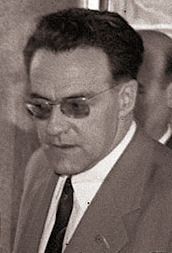Hasan Brkić
| Hasan Brkić | |
|---|---|
 |
|
| 4th President of the Executive Council of the Socialist Republic of Bosnia and Herzegovina | |
|
In office 1963 – 14 July 1965 |
|
| Preceded by | Osman Karabegović |
| Succeeded by | Rudi Kolak |
| Personal details | |
| Born |
16 July 1913 Livno, Bosnia and Herzegovina, Austria-Hungary |
| Died | 14 July 1965 (aged 51) Sarajevo, Bosnia and Herzegovina, Yugoslavia |
| Citizenship | Yugoslav |
| Nationality | Bosniak |
| Political party | League of Communists of Yugoslavia |
| Profession | Politician, soldier |
| Awards |
Order of the People's Hero Order of the People's Liberation Order of the Yugoslav Flag Order of Brotherhood and Unity Order of Bravery Partisan Memorial |
| Military service | |
| Nickname(s) | Aco |
| Allegiance |
|
| Service/branch |
Yugoslav Partisans Yugoslav People's Army |
| Years of service | 1941–1945 1965 |
| Rank | Colonel |
Hasan Brkić (16 July 1913 – 14 July 1965) was a Yugoslav and Bosnian communist and partisan. He was also recipient of People's Hero of Yugoslavia. From 1963 to 1965 he was President of the Executive Council of the Socialist Republic of Bosnia and Herzegovina.
Brkić was born on 16 July 1913 in Livno where he attended elementary school. He attended gymnasium in Bihać, Banja Luka and Sarajevo. After graduation from high school, Brkić attended Law School at the University of Belgrade where he graduated in 1937.
During his high school days he was a member of the Communist Party Youth. During his student days in Belgrade he was prominent in leading the circles of the Revolutionary Students' Movement. He became a member of the Communist Party of Yugoslavia in 1933. As a representative of the University of Belgrade, he participated, along with Ivo Lola Ribar and Veljko Vlahović, on the Congress of World Federation of Students in Prague in 1936. Because of his communist activities during the study, Brkić was repeatedly arrested by the police.
After he finished his study Brkić went to Sarajevo and became employee of the "Agrarna banka" (English: Agricultural Bank). Soon after he arrived in Sarajevo he made a connection with the Communist Party and again became politically active. Because of his communist activity he was fired from the service in bank, later he found a job as a municipal official, after which he worked as a law clerk. From 1938 along with attorneys of the Central Committee of the Communist arty, he worked on the development and consultations of the organisations of Communist Party in Bosnia and Herzegovina. Brkić also participated in Fourth Regional Conference of the Communist Party of Yugoslavia for Bosnia and Herzegovina held in Mostar in 1938. In 1940, he became a secretary of the Sarajevo District Committee for the Communist Party of Yugoslavia.
...
Wikipedia
